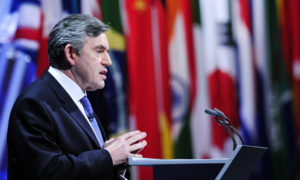The 2009 G-20 summit is in full swing in London and, by all appearances, it seems to be producing a number of interesting results to confront the Global financial crisis. For instance, British PM Gordon Brown announced that world leaders attending the summit in London Thursday laid out a raft of measures in a G-20 communique they said would shorten recession and save jobs. UK Prime Minister Gordon Brown said an additional $1 trillion was agreed — most of it going to the International Monetary Fund (IMF) The U.S. and Britain wanted countries to agree to more economic stimulus ahead of new rules for the banking system. While France and Germany wanted to achieve the new regulatory framework first — and tougher ones than initially suggested — and remained resistant to pumping more money into their economies.
Brown said the final deal included agreement on tighter regulation of hedge funds, tax havens and the banking system. “The banking secrecy of the past must come to an end,” said Brown. “We are engaging in a deep process of restructuring our financial system for the future.”
The leaders of France and Germany, Nicolas Sarkozy and Angela Merkel, declared yesterday that tighter regulation of hedge funds and offshore tax havens was a “non-negotiable” goal of the summit. As the G-20 deal was summarized, leaders said they wanted to find ways to stabilize financial markets throughout the world and pull the world out of a deepening recession. Read full story.
I will continue to add details as I track developments on-line and from conference calls from some of our firm analysts on-the-ground in London. This much is clear: the Markets are responding favorably to developments. So far. . .
President Obama for his part addressed the issue of tying executive compensation to shareholder vote approval, and to the long-term financial performance of a company. He also outlined the consensus on international accounting standards and increased reporting transparency. He also confronted the issue of the waning ‘Washington Consensus’ in global development and heralded the emergence of a new ‘Internationalism’ in coordinating solutions to present and future global economic crises. He noted,
“We have agreed upon a series of unprecedented steps to restore growth and prevent a crisis like this from happening again.” “We have rejected the protectionism that could deepen this crisis. … This cooperation between the world’s leading economies signals our support for open markets.”…”Second, we are committed to comprehensive reform of a failed regulatory system.” Obama added: “We can rebuild our global prosperity if we act with the sense of common purpose, persistence, and optimism that our moment demands.”
In the end, it appears pre-summit preparations were quite detailed. The leaders who attended came with specific, workable proposals; and Brown, who chaired the meeting for today’s long session, was successful in moving the agenda. The summit — which also served as President Obama’s debut on the world stage — yielded what seemed to be a more forceful and detailed blueprint for recovery than a similar gathering in 1933, which failed to fend off the rampant protectionism and misery of the Great Depression.
The Group of 20 also agreed on new global rules to cap the pay and bonuses of bankers, as well as a common approach to dealing with the toxic assets on the balance sheets of the world’s banks. That is an issue that has bedeviled the Obama administration and other governments.

Brown moved the agenda forward
Among the steps Mr. Brown detailed are strict new regulations on hedge funds and rating agencies, as well as a crackdown on tax havens, which will be publicly named and subject to sanctions if they do not agree to share tax information with the authorities of other countries.
Giving teeth to an endorsement of free trade at the last summit in Washington, the countries agreed to “name and shame” countries that erected trade barriers. They also pledged $250 billion in financing for trade through the World Bank (WB). Read full story here.